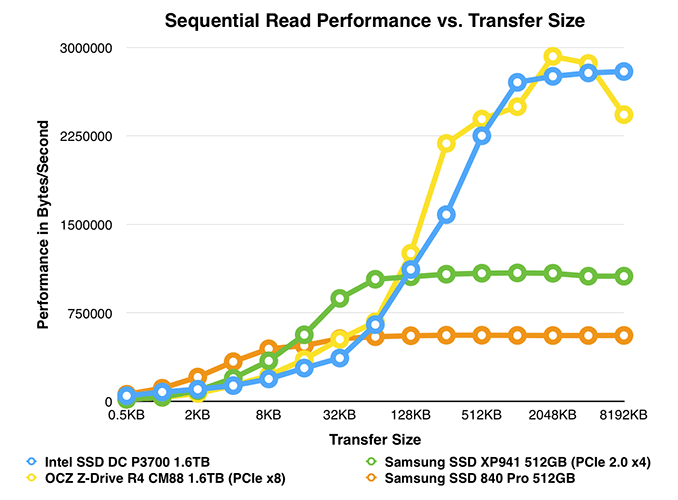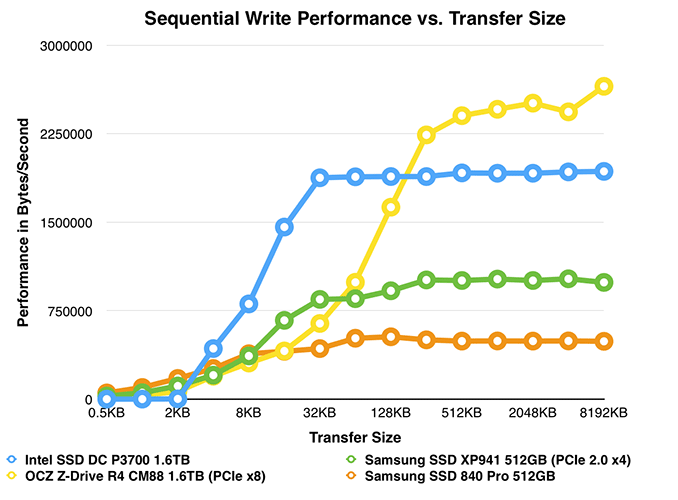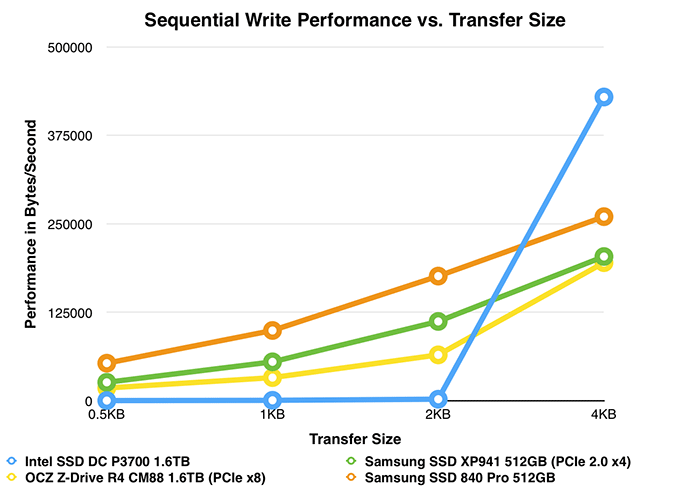The Intel SSD DC P3700 Review Part 2: NVMe on Client Workloads
by Anand Lal Shimpi on June 10, 2014 12:07 AM EST- Posted in
- Storage
- SSDs
- Intel
- Intel SSD DC P3700
- NVMe
Performance vs. Transfer Size
ATTO is a useful tool for quickly benchmarking performance across various transfer sizes. You can get the complete data set in Bench. The P3700 does a good job of scaling performance, although Samsung definitely holds an advantage at some of the smaller transfer sizes when it comes to reads.
The story changes a bit if we look at sequential writes:
Note the ultra low performance at really small transfer sizes (512B - 2KB). To better showcase what I was seeing, I cropped out the larger transfers and just focused on the first few datapoints:
The P3700's performance is really low when it comes to ultra small sequential write transfers. Once you hit 4KB the P3700's performance skyrockets, but up until that point it's substantially slower than even a high end SATA drive. As very few workloads actually care about performance down here I suspect it's something that Intel never optimized for.













36 Comments
View All Comments
TelstarTOS - Tuesday, June 10, 2014 - link
+1TelstarTOS - Tuesday, June 10, 2014 - link
YES! Thank you for doing these further tests :)aperson2437 - Tuesday, June 10, 2014 - link
If I had money burning a hole in my pocket and there were computers available that could support these new SSDs I'd be buying one as soon as possible ... especially the P3700. Love those endurance numbers as much as the speed benchmarks. I can't wait until there is intense competition for these NVMe drives and the prices for 500 GB+ 3700s become as affordable as the Samsung 840 Pro SSD etc.Looks like the days of being irritated having to twiddle your thumbs looking at an hourglass while some program or game loads is about to be over with in the next few years. Near instantaneous full reboots of Windows. Awesome just thinking about it. THIS is what will amaze people once everyone can afford these NVMe drives. I think these SSDs will be a huge hit. Just gotta get that freakin price down!
seapeople - Tuesday, June 10, 2014 - link
I can see it now. The year is 2020. Joe Schmo unpacks his brand new screaming fast Dell with a top notch PCIE SSD. He gets out the timer and boots it up. Total boot time is 47 seconds, with 42 of that being the BIOS load. Then it only takes 45 more seconds for the wireless card to connect to the network. Yes.xMoe - Sunday, June 15, 2014 - link
hopefully the PCIe is on PCIe 4 and the time is down to 4.5 sec total boot to desktop/network ready time. If Windows 9 is worse than Windows 8 - all bets are off!Windows 8x - The Worst! of BOTH worlds! - for the price of 1/2 (or is it no charge already?).
Cerb - Saturday, June 14, 2014 - link
Impressive. The earliest tests didn't look at that hot for client work, but these sure do, and match up with PCPer's results. Now we just need to see the <$0.75/GB consumer models, how they fare, and how quickly NVMe support matures. If it's anything like AHCI was for HDDs, 2016 will be a killer year for storage :).